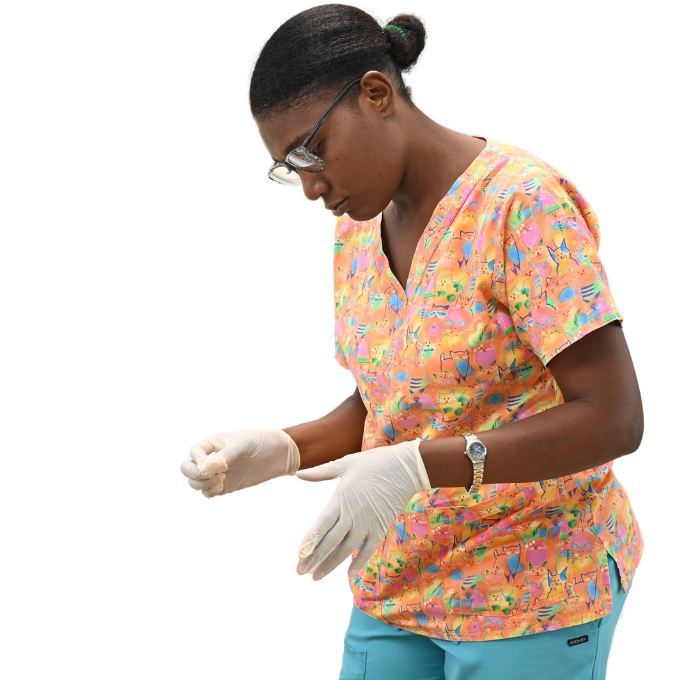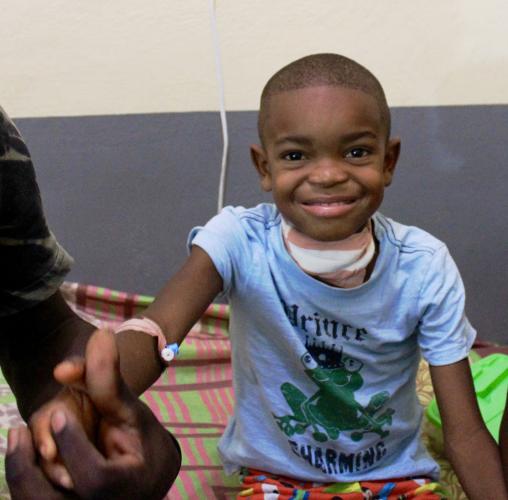“Health equity means providing the same quality of care for all people, whether you are poor or rich.”
Your donation will help Head Emergency Room Nurse Geneviève Edumé and her team care for patients at the only 24/7 ER in southern Haiti.


Dr. Danica Gomes interrupted the SBH staff meeting one Wednesday morning in December 2016 to report the hospital’s first diphtheria case in quite some time. Six-year-old Anchelo Mondesir from the nearby town of Fond-des-Negs had arrived on a motorcycle, huddled between his mother and father. Everyone at SBH had been warily expecting a surge of diphtheria patients after the University Hospital of Mirebalais reported ten patients in the last month, six of who died from complications.
Diphtheria, like tetanus, is commonly vaccinated against in the United States and as a result, is extraordinarily rare. Your standard booster shots for tetanus also contain a diphtheria booster. But in places with low immunization levels, diphtheria can be passed through respiratory droplets from coughing and sneezing.
The threat of disease spread required HEI/SBH’s leadership team to act quickly. We assessed our stock of vaccines to ensure ample supply should diphtheria grow into a larger danger to our community, and immediately vaccinated the medical staff who had been in close contact with the patient beginning with the Emergency Team and Surgical Team.
But the greatest challenge was a lack of quarantine space. Diphtheria is extremely contagious, and we could not contaminate the cholera tents or tuberculosis isolation area with a diphtheria patient and we could not risk the health of the patients in our wards. The only option was to retrofit a small procedure room as a makeshift quarantine space. The room would be safe for Anchelo, his family, and the rest of the patients at the hospital, but conditions were not ideal. Playspace was nonexistent and his parents both sleep on the tiny floor space available at the foot of his bed.
In a standard case, diphtheria will affect the victim’s throat, coating tonsils in mucus and swelling the lymph nodes. Swelling can happen so rapidly that a patient’s airway will be constricted, known as “bull neck”. Breathing can become difficult or even impossible in a matter of hours. Anchelo’s hoarse and shallow breaths indicated that action had to be taken immediately. His slender neck had already swelled by the time he arrived. And as he opened his mouth for doctors to check his tonsils, they noticed enormous white patches. Our emergency team carefully monitored Anchelo for an hour before deciding that he would need a tracheostomy to survive.
In the first year of SBH’s surgical program, no patient had ever needed a tracheostomy. Dr. Luther, SBH’s general surgeon, prepared his team by emphasizing how quickly and effectively they must act. When a patient’s throat is as closed as Anchelo’s, anesthesia will totally cut off the passage of air. While they inserted the tracheostomy tube, every second that passed was another second Anchelo would be without oxygen. After less than two minutes the procedure was complete and Anchelo started to be able to get sufficient air in his lungs. Now, with rest and another week of antibiotics and antitoxin and he is on the road to recovery.
Anchelo’s diagnosis and treatment at SBH shows what a fully functioning hospital and health care system can do—namely, save a life. But the details matter: a quality supply chain ensured adequate vaccines for our staff, and our new state-of-the-art surgical center with a motivated and talented surgical team meant we could act fast enough to save Anchelo’s life.
But the challenge in ensuring that patients with infectious diseases like diphtheria are properly treated without endangering other patients has made all SBH staff anxious to move into our upcoming Infections Disease Center, set to begin construction in early 2017. The IDC will have three isolation rooms specially designed to handle cases like Anchelo’s, and will make the treatment and containment of infectious diseases much easier and more effective in the future.
Your donation will help Head Emergency Room Nurse Geneviève Edumé and her team care for patients at the only 24/7 ER in southern Haiti.
